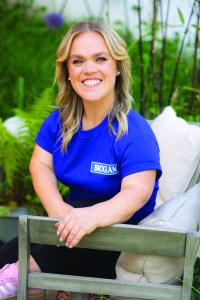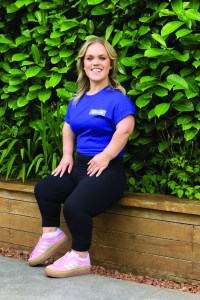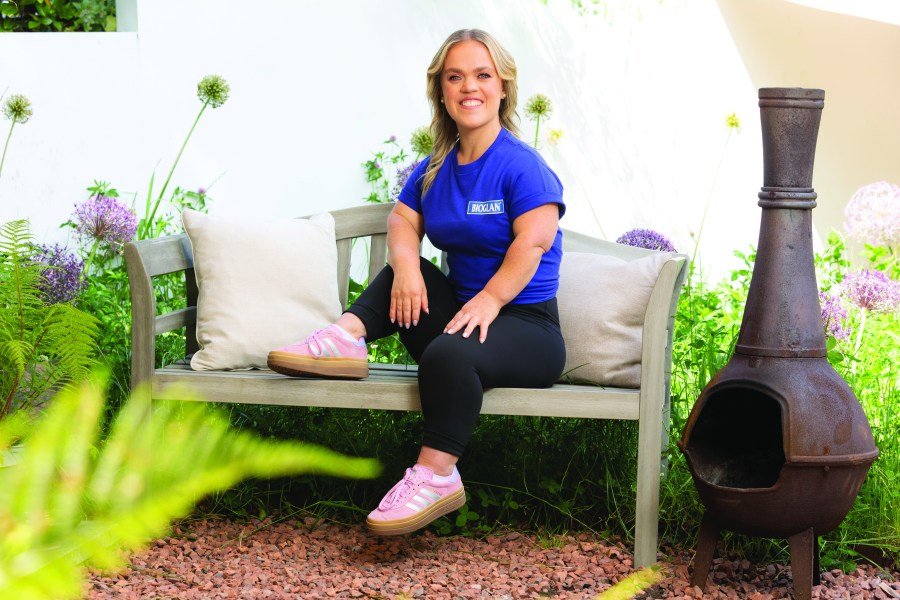Paralympic champion swimmer Ellie Simmonds OBE talks about finding balance after retirement, learning to say ‘no’ and why she firmly believes that sport is for all. Words: Joanna Ebsworth.
If you thought Ellie Simmonds would be swapping life in the fast lane for a slower pace when she announced her retirement from competitive swimming three years ago, you’d be mistaken. Because, according to the 29-year-old multiple world record breaker – who captured the hearts of the British public back in 2008 after winning her first Paralympic gold at the tender age of 13 – she’s not ready to slow down yet. In fact, she’s just getting started.
‘To be honest, I think I’m busier now than when I was as an athlete’, exclaims Simmonds, who won an incredible five Paralympic golds, eight World Championship golds and 10 European golds before hanging up her professional swimming goggles after the 2021 Tokyo Paralympics. ‘When I was an athlete, my life was very regimented, and I had set a time for where I had to be every morning and afternoon. Whereas now, my work ranges from documentaries and TV shows to corporate events and commentating, so there’s no set routine. Every day is different, so it’s really important for me to strike the right balance between my old life as an athlete and this next chapter of my working life. That’s one of the reasons why I’m involved in the supplement brand Bioglan’s latest In Bioglan Balance campaign,’ she adds, ‘so I can learn ways to take a more holistic approach to my health and wellbeing, and talk with other athletes about how we all find balance. I think there’s so much pressure on all of us from society to always be on the go, and I think we can sometimes forget to take time for ourselves and work out what makes us tick so we can be happy.’
While Simmonds is happy to be on the receiving end of many exciting career opportunities, she admits that learning not to say ‘yes’ to every single offer is becoming a determining factor in helping her to establish a better work/life balance. ‘The balance I have in life now is different to the balance I had as a competitive swimmer,’ she says. ‘As an athlete, what I did outside of the pool impacted what I did inside the pool, so I could easily say ‘no’ to things when I had to wake up at 4.45am the next day for training. In a way, I was a bit more selfish, but I also think I didn’t give family and friends the time I should have because I was always away. That was a big sacrifice, but my values have changed, and making time for family, friends and exercise is the most important thing for looking after my physical and mental health, and providing me with the balance I need to cope with everything I’m doing.’

‘Having a diary, being organised in my life and in my head, and prioritising the things that keep me feeling balanced definitely help to relieve stress’
Having an awareness of your lifestyle in the first place is key to finding balance, says Simmonds, as is having the confidence to say no to great opportunities that might not serve you in the long run. ‘I think we can all feel a bit scared to say “no”, but, sometimes, you really do need to put yourself first,’ she explains. ‘In fact, I got friendly with a wonderful lady recently who sent me a bracelet that says “no” on it to remind me that’s it’s okay to say it. It’s really important to me that I’m not working 24/7, seven days a week, so I can see the people and do the things that matter to me. Having a diary, being organised in my life and in my head, and prioritising the things that keep me feeling balanced definitely help to relieve stress and keep the weight off my shoulders. I think we all have a couple of things we can do each day to help us feel happy and more balanced,’ she affirms, ‘whether that’s going for a walk, spending time with friends and family, doing Pilates, taking supplements or having some alone time, because I think we can forget that it’s okay to have some time to ourselves!’
‘Maybe it’s because I’m getting older,’ she continues, ‘but I like having time to myself more and more, even if it’s just sitting on the sofa watching a good series. Life can be so stressful, and I think we’ve all suffered from burnout or exhaustion at some point. But if you can find that balance where you can work and have time to see friends, exercise, eat well and get a good night’s sleep, you’ll wake up feeling energised rather than tired, and then everything is so much easier after that: you feel like you can climb Everest! When I’m looking after myself, I know I can do everything to the best of my ability, which is why maintaining balance in body and mind with good company, sleep, food and exercise is so important to me with the life I lead now’.
Helen Glover on her Olympic comeback
Talking to Simmonds about her current fitness regime, it’s clear her workouts are just as crucial to her today as they ever were, if not more so. ‘When I exercised every single day as an athlete, I did it because it was my job. And while I got to enjoy all the physical and mental benefits of all that exercise, I don’t think I realised how important they were for my health at the time. But I’ve definitely realised that now,’ says Simmonds. ‘I got up early this morning to go to the gym because it just helps me to start the day positively and feel good about myself. I think exercise is one of those things where you sometimes feel like you can’t be bothered to do it, but then you do it and you feel amazing for the rest of the day: like you’re ready to tackle everything else.’
Simmonds says that her experiences of fitness since retirement have shown her that exercise isn’t just about going to the gym all the time, but rather it’s about being in nature, spending time alone to process everything that is going on in life, or ‘having so much fun playing a sport with others that you forget you’re exercising!’.
‘I’ve realised there are so many ways to move your body that help you to keep your joints and muscles healthy, and to look after your body for later life,’ she explains. ‘But for me, it’s the mental side of sport and exercise that gives you so much more. You get to put your phone to the side for an hour, escape the world, and push your body. And the release of endorphins you get is something else! That’s why I think it’s so important that all people, whatever their ability or disability or age, get involved with sport. Sport is for everyone.’

‘Every size and body shape should be celebrated, so just go out there and do what makes you happy’
Simmonds was encouraged to try swimming at a young age to learn a life skill and be safe in the water, but she soon found it channelled into her competitive nature and need to be on the go. ‘I was never a child that could sit on the sofa all the time. I always had to be doing something, and did every activity possible after school. Swimming was always a hobby and something I loved – I think you’ve got to love it to the capacity I did when it takes over your life – but the turning point came when I watched the 2004 Athens Paralympics,’ she recalls.
‘Before that, I’d been swimming for my club on a day-to-day basis, doing five or six sessions a week, and then swimming for them competitively at the weekends, but I never knew how good I was because I was competing against non-disabled kids. I didn’t win any races – was coming last – but I still loved it and, in a sense, I think that made me work a lot harder to keep up with them and made me stronger as an athlete later in life. Watching the Athens Games and realising that there was Paralympic sport and disability sport changed everything. After my mum did some research, I went to my first disability gala in December 2004, and that’s when the British Swimming talent spotters saw me, told me I was really good, and invited me onto the British Swimming Start Programme. I just wanted to become a Paralympic gold medalist and win medals like my peers, and with the support of British Swimming, and my family and coaches, I went to my first world championships in 2006 at the age of 12.’
So, how does Simmonds recommend we tap into our inner champion if, after watching the Paris 2024 Games, we feel inspired to try a new sport but have physical or mental barriers that prevent us from getting started? ‘You know, I think we live in a society where we definitely compare ourselves to others, especially with social media, but I would say try not to worry about other people,’ she says. ‘Just go to the gym, or for a swim, or for a walk, or do a class, and don’t worry about the clothes you’re wearing if you feel comfortable. Every size and body shape should be celebrated, so just go out there and do what makes you happy. Find a sport or activity you really enjoy, because when you do, you’ll get so much more out of it. My mum does a walking netball class, but you could do aquarobics or join a dog-walking group. My point is there are so many ways to move, but I also think taking a friend along as well really helps because it gives you a chance to enjoy the social aspect while doing something good for your body.’
Simmonds’ words are inspiring indeed, and a stark reminder that sport doesn’t have to be competitive to be worthwhile or enjoyable. But, with the Paris Paralympics coming up, we can’t help but ask her if she will miss competing at this year’s Games. ‘Do you know what? No!’, she says bluntly, with a laugh. ‘I’ve had my time. I had plenty of Games that I absolutely loved. And you know what? I’m going to go to the Paris Games and enjoy sitting on the sofa to talk about the sport and the athletes and the swimming. There’s a lot of pressure on the athletes, and you give your life for your sport and sacrifice so, so much, so it’ll be nice not to feel the stress and pressure of competing. It’s just nice to know that I did what I wanted to do, and I achieved what I wanted to achieve. Now, I’ve got the easy job.’
Ellie Simmonds has partnered with supplement brand Bioglan for its third series of ‘In Bioglan Balance’ to show how she finds balance in her busy life. To watch the series, visit instagram.com/@bioglansupplements







